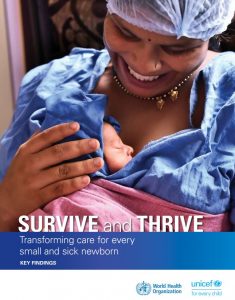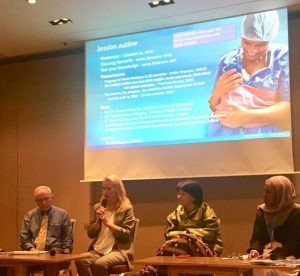A guest article by Livia Nagy Bonnard,
EFCNI PAB member and co-founder of Melletted a helyem Egyesület (Right(s) beside you)
Each year, health officials from all 194 WHO Member States gather in Geneva, Switzerland, for the 72nd World Health Assembly. After two years of preparation, the final report “Survive and Thrive; Transforming Care for every small and sick newborn” has been presented at this meeting. At a panel, the report’s findings were highlighted and discussed, together with two further reports, the “Every Newborn 2019 Progress Report” and the first “Global Standardised Estimates on Low Birth Weight”. EFCNI was represented at the panel by PAB member Livia Nagy Bonnard from Melletted a helyem Egyesület.
Three new reports on newborn health call for action

(c) WHO/Unicef
Dr Stefan Peterson (Chief of Health Section, UNICEF HQ) pointed out that newborn deaths still account for 47% of all deaths of children under 5 years. Still, 7.000 babies die each day, worldwide. Five years ago, the Every Newborn Action Plan set out evidence-based solutions with a clear road map till 2020 and beyond. “With only one year remaining, efforts must be intensified to address the causes of newborn death and disabilty, to improve the quality of care with technological interventions, research on newborn health, improved data collection also the community engagement as the power of parents is a driving change for maternal and newborn health.”, stated Peterson.
Dr Francesco Branca (Director, Nutrition for Health and Development, WHO) presented the WHO-UNICEF report about “Global Standardised Estimates on Low Birth Weight”. According to these findings, more than 20.5 million babies were born with low birth weight in 2015, more than the half of them in Asia. The report highlights gaps in the availability and quality of birthweight data across countries and regions. The causes of low birthweight in more developed regions and countries is associated with prematurity as a result of maternal illness, maternal age and social environment. In less developed regions, the primary cause is poor fetal growth linked to poor maternal nutrition before and during pregnancy.
Dr Ornella Lincetto (Medical Officer Newborn Health, WHO) provided an overview of the “Survive and Thrive” report which highlights the need for accurate and reliable data to facilitate planning, to help measure quality, outcomes and impact, and to promote accountability. Highlighting the importance of equipping health workers to care for small and sick newborns also via family centred care as well as nurturing and developmentally supportive care. “ I urge stakeholders to take actions to advance the global agenda for small and sick newborn care, including in humanitarian settings!”, concluded Dr Lincetto.
During the panel discussion, Dr Fawziya Abikar Nur (Minister of Health from Somalia) spoke about how to support newborn health in the face of a protracted emergency context as the highest burden of newborn deaths takes place in humanitarian settings. Malawi , for instance, was one of the first countries to have a Newborn Action Plan. Now, after four years of implementation, Dr Charles Mwansambo (Chief of Health Services, Ministry of Health) spoke about their experiences and gave advice to those who are at an earlier phase in their process,
Dr William Keenan (Director of the International Pediatric Association) highlighted the need of compassionate care by all health professionals everywhere. “Professional organizations reaching from midwifery, to nursing, obstetrics and peadiatrics, play a critical role in addressing the need for competent health providers of newborn care.”, explained Dr Keenan.
Parental involvement advances survival, health and neurological development of the infant

Livia Nagy Bonnard speaking at the WHO panel; (c) Nagy Bonnard/EFCNI
Livia Nagy, parent representative from the European Foundation for the Care of Newborn Infants (EFCNI) pointed out how crucial parental participation is throughout neonatal care, drawing from her own experience. Evidence-based data and statistics show the positive impact of family-centred care on survival, health and neurological development of the child. Moreover, there are significant differences in mortality and morbidity between Eastern and Western European countries. This calls for transformation in care with parental engagement and participation in neonatal units, and for harmonised standards of care throughout Europe, as all European preterm babies have the right to the same care, survival chances and to a healthy life.
Helga Fogstad (Executive Director, Partnership of Maternal, Newborn and Child Health) rounded the gathering up and stressed how forming strategic partnerships and innovative approaches can transform newborn care, from availability and quality to uptake and affordability. “By working together, we can make the impossible possible”.
Click here for the programme of Every Newborn Everywhere: bit.ly/Every-Newborn
Learn more about the “Survive and Thrive” report here: bit.ly/30Gb2Pm
Read more (in Hungarian): Right(s) beside you – Melletted a Helyem – Egyesület

